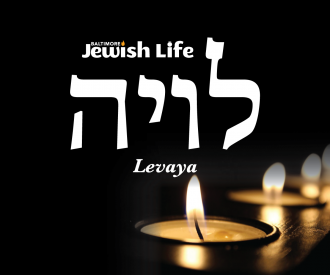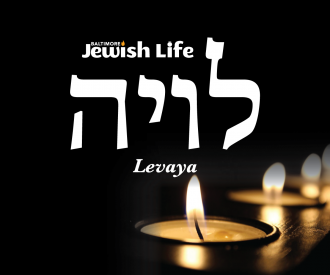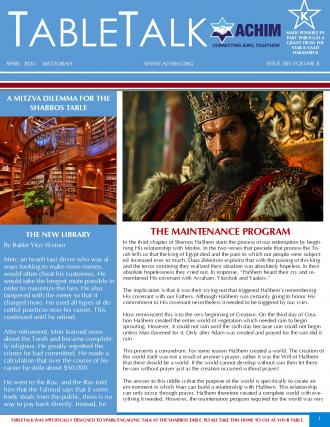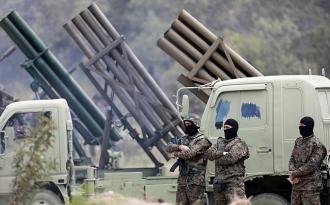A dear friend who recently recovered from Covid shared with me that he is still suffering from the effects of the illness. Although his sense of smell has returned, his ability to taste the food he eats is non-existent. In his own words, “Eating a piece of Challah tastes no different than eating paper!” He added that the lack of any pleasure in eating takes away the motivation to eat, though the appetite is present and compels him to go through the motions of consumption, but joylessly.
Isn’t that the way many of us feel, unfortunately, at times when engaging in mitzvos? We simply do not feel any pleasure though we plod on out of duty.
At times that emptiness is not due solely to the lack of connection we feel to the deed at hand. Rather, our displeasure stems from not having merited to bring to fruition a noble plan or goal, due to the myriad of obstacles that often block our paths, despite having exerted much energy and time.
One of the very first examples of Avraham Avinu’s exemplary kindness, was the episode where he provides energetically — despite great personal pain — for his three unexpected guests, only to discover they were angels who had no personal benefit from his material efforts anyway. Yet, that fact did not defeat him, but in fact empowered him to follow G-d’s will enthusiastically, no matter the lack of accomplishment.
Avraham Avinu declares I am but dust and ash. This alludes to his having been nearly reduced to dust in the battle against the four kings when saving Lot, and his almost being burnt into ashes after being thrown into the furnace at the hands of Nimrod.
But... he did not become dust or ash. So how can he proclaim he is dust and ash?
The Midrash states that G-d promised Avraham that in the merit of his declaration that he is dust and ash his descendants will be given the statute of Parah Adumah, where it is stated: They shall take for the contaminated person some of the עפר — dust from the burnt purification offering... A pure man shall gather the אפר — ash of the cow...
It is a bit incongruous, as the physical use of these elements in the purification process represent Avraham’s ‘willingness’ to be turned into dust or ash, not so much his having been turned into dust and ash.
Perhaps therein lies the essence of the message of the significance of this specific command to epitomize the principle of that category of law defined as חוק — a statute with no evident reason.
The Torah begins the discussion of the laws of Parah Adumah, the Red Heifer, with the introduction: This is חקת התורה — a decree of the Torah, seemingly encompassing all of Torah in its identification as a חק.
The Talmud reports the famous episode of the non-Jew, Dama ben Nesinah, who even at the expense of a great loss of a business opportunity — the sale of an expensive gem that was needed in the Temple that was in his possession — refused to disturb and awake his father to gain access to it. He was rewarded subsequently with the birth of a red heifer that he was able to eventually sell instead, regaining the lost gain.
The Holy Kotzker observes that he was specifically rewarded with the possessing an item that is termed a חק, a law with no obvious rationale, to accentuate that although a gentile might be willing to forfeit a fortune to perform a logical deed — such as honoring a parent — only a Jew would go that same distance in acquiring an item necessary to fulfill even a statute that makes no apparent sense in human perception.
It is not just about loyally following precepts that are not within our comprehension, but more so about our allegiance to all those other ‘rational’ commandments in the Torah, adhering to them equally so, by not manipulating the reasoning to our convenience.
So often, especially in the realm of those laws that govern interaction between fellow men, we rationalize how this one is undeserving, justifying our anger and contempt with all sorts of excuses. We must follow all the precepts of the Torah with an awareness of our diminished ability to comprehend its full import and pledge allegiance fully to G-d unconditionally.
But there is more.
Throughout our history, so many, even the most righteous, have not actualized all their hoped-for goals. Whether due to personal challenges that impeded them, or the realities of events that impinge on communities and their ability to thrive and function with normalcy. Within the collective and personal barriers that stifle growth, we must live with that same sense of drive, purpose, and ambition that Avraham Avinu infused his life with, even in the face of apparent wasted energy or time.
It matters not whether we become dust and ash. What is critical is our ambition and drive to do His will, no matter what the outcome may be.
The Midrash reveals that within these laws of Parah Adumah lies the key to our redemption.
The Yalkut interprets the taking of a Parah, a cow, as referring to the rebellious cow, the Jewish people... a red one, indicative of their sins... without a blemish, are inherently perfect... upon which a yoke has not come, who revoked the yoke of G-d... he shall take it to the outside of the camp, they were exiled... someone shall burn the cow before his eyes, the Temple was destroyed... A pure man shall gather, this is the Holy One Blessed Be He... the ash, all the exiles... and place it outside the camp in a pure place, this is Yerushalayim which is pure...
Our history is laden with many challenges, on a national and personal level. G-d himself knows of our plight and how we have persevered despite our failures, even when all seemed tasteless. He alone will gather those who mirror the appellation,‘dust and ash’ of Avraham Avinu, who maintain their drive despite the lack of accomplishment, but humbly never give up.
This is the reason we read Parah prior to Chodesh, for only those who do not lose their verve for life are able to renew with vigor their service to Hashem.
באהבה,
צבי יהודה טייכמאן











